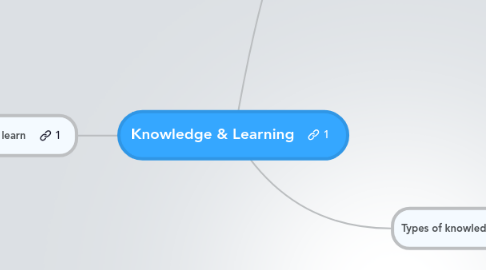
1. Explicit knowledge
1.1. empirical
1.2. semantic
1.3. systemic
1.4. logical
2. Types of knowledge
2.1. Philosophical Types of Knowledge
2.1.1. Personal
2.1.2. Procedural
2.1.3. Propositional
2.2. Tacit knowledge
2.2.1. Experience, Main methods for the acquisition and accumulation
2.2.2. Know-how; vis-a-vis know-why and know-what, Potential of aggregation and modes of appropriation - involvement
2.2.3. Judgement; not easy to be written down, not codifiable and mechanism of transferring knowledge
2.3. Factual Knowledge
2.3.1. Terminology
2.3.2. Specific Details and Elements
2.4. Conceptual Knowledge
2.4.1. Classifications and Categories
2.4.2. Principles and Generalizations
2.4.3. Theories, Models, and Structures
2.5. Procedural Knowledge
2.5.1. Subject‐specific Skills and Algorithms
2.5.2. Subject‐specific Techniques and Methods
2.5.3. Criteria for Determining When to Use Appropriate Procedures
2.6. Meta‐Cognitive Knowledge
2.6.1. Strategic Knowledge
2.6.2. Knowledge about Cognitive Tasks
2.6.3. Self‐Knowledge
3. How people learn
3.1. Formal
3.1.1. Classroom-Based
3.1.1.1. Lectures
3.1.1.2. Presentation
3.1.1.3. Assessment
3.1.1.4. Q&A
3.1.1.5. Assignment
3.2. Informal
3.2.1. Philosophy-Based Learning Theory
3.2.1.1. Rationalism
3.2.1.1.1. Truth & Knowledge is found within ourselves
3.2.1.2. Empiricism
3.2.1.2.1. Truth & Knowledge found outside of ourselves using our senses
3.2.2. Gaming
3.2.2.1. Simulations
3.2.2.2. Role Play
3.2.3. Reading
3.2.3.1. online learning
3.2.3.2. Text/Research Books
3.3. Both
3.3.1. Doing
3.3.1.1. Experiential (Hands-On)
3.3.1.2. Trial & Error
3.3.1.3. experimentation
3.3.1.3.1. Research
3.3.1.4. OJT
3.3.1.4.1. Apprenticeship
3.3.2. E-Learning
3.3.2.1. Scenario simulation
3.3.2.2. cyber survey
3.3.2.3. e-Quiz
3.3.2.4. Videos
3.3.2.5. Computer Aided Instruction
3.3.3. Collaborative Learning
3.3.3.1. PBL
3.3.3.2. Action Learning
3.3.3.3. Role-Play
3.3.3.4. Faciliative Learning
3.3.3.5. Research & Presentation
3.3.3.6. Reflection
3.3.3.7. Sharing
3.3.3.8. Story Telling
3.3.4. Observing
3.3.4.1. Bandura Social Learning theory
3.3.4.2. Modeling
